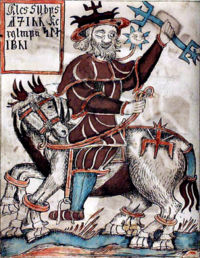|
|||
|
Philatelia.Net / Pirates. Bandits. Adventurers / Plots / The directory «Plots»Odin (Óðinn)Odin is considered the chief god in Norse paganism. Homologous with the Anglo-Saxon Wōden and the Old High German Wotan, it is descended from Proto-Germanic *Wōđinaz or *Wōđanaz. The name Odin is generally accepted as the modern translation; although, in some cases, older translations of his name may be used or preferred. His name is related to ór, meaning "fury, excitation", besides "mind", or "poetry". His role, like many of the Norse pantheon, is complex. He is associated with wisdom, war, battle, and death, and also magic, poetry, prophecy, victory, and the hunt. Mead of Poetry, also known as Mead of Suttungr, in Norse mythology is a mythical beverage that whoever "drinks becomes a skald or scholar" to recite any information and solve any question. This myth was reported by Snorri Sturluson. The drink is a vivid metaphor for poetic inspiration, often associated with Odin the god of 'possession' via berserkr rage or poetic inspiration. After the Æsir-Vanir War, the gods sealed the truce they had just concluded by spitting in a vat. To keep a symbol of this truce, they created from their spittle a man named Kvasir. He was so wise that there were no questions he could not answer. He traveled around the world to give knowledge to mankind. One day, he visited the dwarves Fjalar and Galar. They killed him and poured his blood into two vats and a pot called Boðn, Són and Óðrerir. They mixed his blood with honey, thus creating a mead which made anybody who drank it a "poet or scholar" ("skáld eða frœðamaðr"). The dwarves explained to the gods that Kvasir had suffocated in intelligence. Fjallar and Gallar invited a giant, Gilling, and his wife. They took him at sea and capsized their boat. The giant drowned. The dwarves then came back home and broke the news to Gilling's wife, which plunged her deep in grief. Fjallar proposed showing her the place where her husband had drowned but when she crossed the threshold, Gallar dropped a millstone on her head. When Gilling's son, Suttungr, learnt what had happened, he went to the dwarves' and led them to a reef which was covered with water at high tide. The dwarves implored him and offered him the mead in compensation for his father's death. Suttungr agreed. When he came back home, he stored the mead in a place called Hnitbjörg. His daughter, Gunnlöd, was in charge of guarding it. Odin met nine slaves who were scything hay and offered to sharpen their scythes. His whetstone worked so well that they all wanted to buy it. Odin threw it up in the air and the slaves struggled for it to death, cutting each others' throat. Then he spent the night at Baugi's place. Baugi was Suttung's brother. He complained that business did not go well since his slaves had killed each other and he could not get anybody to stand in for them. Odin, who said his name was Bölverk, proposed to do their work in exchange for a draught of Suttung's mead. Baugi agreed, saying that he would try to persuade his brother. During summer, Bölverk did the work as agreed and, in winter, asked Baugi for his owing. They both went to Suttung's, who refused to give a single drop of the beverage. Bölverk then suggested Baugi to use a trick. He gave him the drill Rati and asked him to dig into Hnitbjörg mountain. After Baugi tried to deceive him, a hole was actually dug and Bölverk slipped into it, having taken the form of a snake. Baugi tried in vain to hit him with the drill. He arrived by Gunnlöd, with whom he spent three nights. Thus he could have three draughts of mead. But each emptied a container. He then transformed into an eagle and flew away. When Suttung discovered the theft, he took the shape of an eagle and pursued Odin. When the Æsir saw him, they displaced containers in which he spat his loot out. But Suttung was so close to him that he let some drop backwards. Anybody could drink this part, which is known as the "rhymester's share" ("skáldfífla hlutr"). But the mead of poetry was given by Odin to the gods and to the men gifted in poetry. Advertising: |
|||
© 2003-2026 Dmitry Karasyuk. Idea, preparation, drawing up
|

